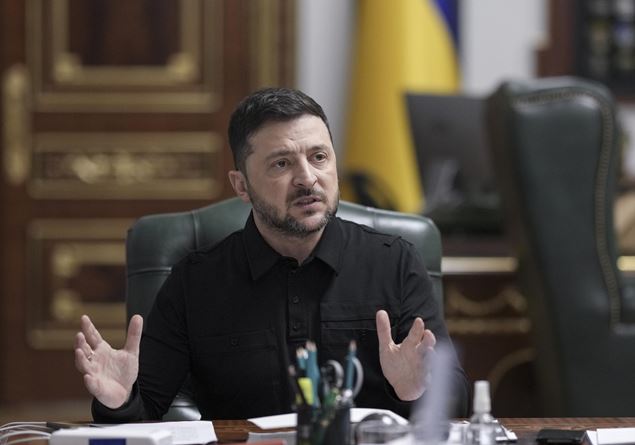President Zelensky visits the troops at the front in the Donetsk region (photo Ansa).
There is no respite for Ukraine, neither on the war front nor on that of internal affairs. From the East, the Donetsk region, increasingly dramatic news is arriving for Pokrovsk, the current main target of the Russian offensive. The commander in chief of the Ukrainian forces Oleksandr Syrskyi, who visited the area, denies that Kyiv’s troops have been surrounded and that the Russians have taken control of the town, inhabited by 60 thousand people before the war, a strategic outpost of the Donbas, whose fall would leave the road to the West open to Moscow’s forces.
But the situation on the ground is extremely difficult for the Ukrainians, according to President Zelensky himself, who said that any decision to withdraw troops rests with military commanders on the ground. The thick fog, which hinders the action of the Ukrainian drones, also facilitates the advance and entry of the Russians into the town. Things are no better in the Zaporizhzhia region, where Ukrainian troops withdrew from the sixth village in the space of two days.
From Canada, the Foreign Ministers of the countries gathered for the G7 reaffirm with determination their support for Ukraine in the defense of its territorial integrity and freedom. However, in an interview with Bloomberg TV relaunched on social media, the Ukrainian president reiterated the need to increase pressure on Russia. And he issued an alarm to the West: «Considering the situation on the battlefield, we don’t see Russia wanting to stop. The problem is, when we look at the Russian military industry, we see that they are increasing their production. And, according to our estimates, they want to continue this war. We have to recognize that they want a big war, they are preparing to be able, in 2029 or 2030 – in that period – to start such a big war. On the European continent. We consider this a truly great challenge.”
Meanwhile, in addition to the conflict, Kyiv was also hit by a heavy corruption scandal that hit the energy sectorjust as Russian attacks aim to knock out the country’s energy infrastructure, leaving thousands of people without light and without heating when the cold of winter is upon us. The scandal exploded following the maxi-operation launched by the Ukrainian National Anti-Corruption Office, which uncovered a system of corruption in the energy sector, with 100 million dollars of laundered funds, which involved Energoatom, the Ukrainian state company that manages the four active nuclear power plants in the country (and produces almost half of the total Ukrainian energy). Timur Mindich, an entrepreneur close to Zelensky, would have organized this system. The president responded to the scandal by calling for the immediate resignation of Energy Minister German Galushchenko and Justice Minister Svitlana Grynchuk, who resigned their positionsor. The Anti-Corruption Office (Nabu) began its investigations in the summer of 2024. The maxi-operation was called “Midas”, from the name of the mythical King Midas, son of Zeus who transformed everything he touched into gold.
The fight against corruption – a deep plague in Ukraine – is one of the fundamental prerogatives for the country’s entry into the European Union. Last July the Ukrainian president gave the green light to a law, approved by Parliament, which limited the independence of the two anti-corruption agencies, the National Anti-Corruption Office (Nabu) and the Office of the Special Anti-Corruption Prosecutor (Sapo). But large street protests, as well as international criticism, particularly from the European Union, forced Kyiv to take a step back and Zelensky signed the decrees that annulled the law and restored the independence of the two entities.
(Ansa photo: Ukrainian president Volodymyr Zelensky)


